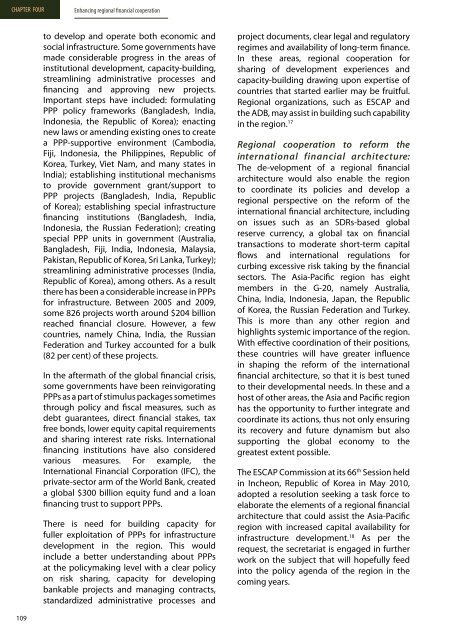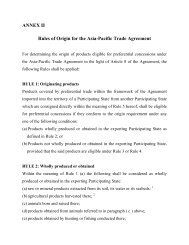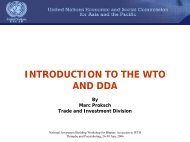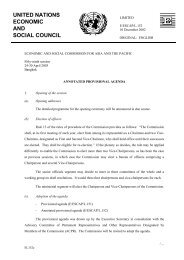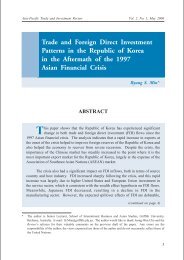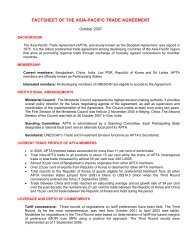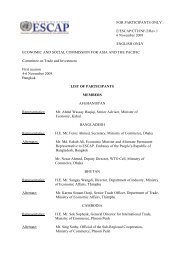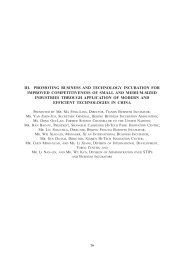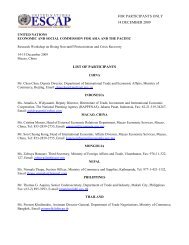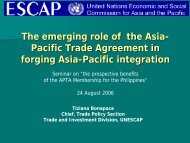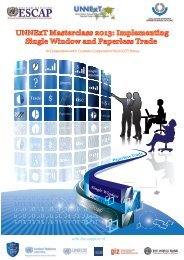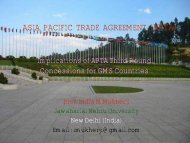Growing Together: Economic Integration for an Inclusive and - escap
Growing Together: Economic Integration for an Inclusive and - escap
Growing Together: Economic Integration for an Inclusive and - escap
Create successful ePaper yourself
Turn your PDF publications into a flip-book with our unique Google optimized e-Paper software.
CHAPTER FOUR<br />
109<br />
Enh<strong>an</strong>cing regional fin<strong>an</strong>cial cooperation<br />
to develop <strong>an</strong>d operate both economic <strong>an</strong>d<br />
social infrastructure. Some governments have<br />
made considerable progress in the areas of<br />
institutional development, capacity-building,<br />
streamlining administrative processes <strong>an</strong>d<br />
fin<strong>an</strong>cing <strong>an</strong>d approving new projects.<br />
Import<strong>an</strong>t steps have included: <strong>for</strong>mulating<br />
PPP policy frameworks (B<strong>an</strong>gladesh, India,<br />
Indonesia, the Republic of Korea); enacting<br />
new laws or amending existing ones to create<br />
a PPP-supportive environment (Cambodia,<br />
Fiji, Indonesia, the Philippines, Republic of<br />
Korea, Turkey, Viet Nam, <strong>an</strong>d m<strong>an</strong>y states in<br />
India); establishing institutional mech<strong>an</strong>isms<br />
to provide government gr<strong>an</strong>t/support to<br />
PPP projects (B<strong>an</strong>gladesh, India, Republic<br />
of Korea); establishing special infrastructure<br />
fin<strong>an</strong>cing institutions (B<strong>an</strong>gladesh, India,<br />
Indonesia, the Russi<strong>an</strong> Federation); creating<br />
special PPP units in government (Australia,<br />
B<strong>an</strong>gladesh, Fiji, India, Indonesia, Malaysia,<br />
Pakist<strong>an</strong>, Republic of Korea, Sri L<strong>an</strong>ka, Turkey);<br />
streamlining administrative processes (India,<br />
Republic of Korea), among others. As a result<br />
there has been a considerable increase in PPPs<br />
<strong>for</strong> infrastructure. Between 2005 <strong>an</strong>d 2009,<br />
some 826 projects worth around $204 billion<br />
reached fin<strong>an</strong>cial closure. However, a few<br />
countries, namely China, India, the Russi<strong>an</strong><br />
Federation <strong>an</strong>d Turkey accounted <strong>for</strong> a bulk<br />
(82 per cent) of these projects.<br />
In the aftermath of the global fin<strong>an</strong>cial crisis,<br />
some governments have been reinvigorating<br />
PPPs as a part of stimulus packages sometimes<br />
through policy <strong>an</strong>d fiscal measures, such as<br />
debt guar<strong>an</strong>tees, direct fin<strong>an</strong>cial stakes, tax<br />
free bonds, lower equity capital requirements<br />
<strong>an</strong>d sharing interest rate risks. International<br />
fin<strong>an</strong>cing institutions have also considered<br />
various measures. For example, the<br />
International Fin<strong>an</strong>cial Corporation (IFC), the<br />
private-sector arm of the World B<strong>an</strong>k, created<br />
a global $300 billion equity fund <strong>an</strong>d a lo<strong>an</strong><br />
fin<strong>an</strong>cing trust to support PPPs.<br />
There is need <strong>for</strong> building capacity <strong>for</strong><br />
fuller exploitation of PPPs <strong>for</strong> infrastructure<br />
development in the region. This would<br />
include a better underst<strong>an</strong>ding about PPPs<br />
at the policymaking level with a clear policy<br />
on risk sharing, capacity <strong>for</strong> developing<br />
b<strong>an</strong>kable projects <strong>an</strong>d m<strong>an</strong>aging contracts,<br />
st<strong>an</strong>dardized administrative processes <strong>an</strong>d<br />
project documents, clear legal <strong>an</strong>d regulatory<br />
regimes <strong>an</strong>d availability of long-term fin<strong>an</strong>ce.<br />
In these areas, regional cooperation <strong>for</strong><br />
sharing of development experiences <strong>an</strong>d<br />
capacity-building drawing upon expertise of<br />
countries that started earlier may be fruitful.<br />
Regional org<strong>an</strong>izations, such as ESCAP <strong>an</strong>d<br />
the ADB, may assist in building such capability<br />
in the region. 17<br />
Regional cooperation to re<strong>for</strong>m the<br />
international fin<strong>an</strong>cial architecture:<br />
The de-velopment of a regional fin<strong>an</strong>cial<br />
architecture would also enable the region<br />
to coordinate its policies <strong>an</strong>d develop a<br />
regional perspective on the re<strong>for</strong>m of the<br />
international fin<strong>an</strong>cial architecture, including<br />
on issues such as <strong>an</strong> SDRs-based global<br />
reserve currency, a global tax on fin<strong>an</strong>cial<br />
tr<strong>an</strong>sactions to moderate short-term capital<br />
flows <strong>an</strong>d international regulations <strong>for</strong><br />
curbing excessive risk taking by the fin<strong>an</strong>cial<br />
sectors. The Asia-Pacific region has eight<br />
members in the G-20, namely Australia,<br />
China, India, Indonesia, Jap<strong>an</strong>, the Republic<br />
of Korea, the Russi<strong>an</strong> Federation <strong>an</strong>d Turkey.<br />
This is more th<strong>an</strong> <strong>an</strong>y other region <strong>an</strong>d<br />
highlights systemic import<strong>an</strong>ce of the region.<br />
With effective coordination of their positions,<br />
these countries will have greater influence<br />
in shaping the re<strong>for</strong>m of the international<br />
fin<strong>an</strong>cial architecture, so that it is best tuned<br />
to their developmental needs. In these <strong>an</strong>d a<br />
host of other areas, the Asia <strong>an</strong>d Pacific region<br />
has the opportunity to further integrate <strong>an</strong>d<br />
coordinate its actions, thus not only ensuring<br />
its recovery <strong>an</strong>d future dynamism but also<br />
supporting the global economy to the<br />
greatest extent possible.<br />
The ESCAP Commission at its 66 th Session held<br />
in Incheon, Republic of Korea in May 2010,<br />
adopted a resolution seeking a task <strong>for</strong>ce to<br />
elaborate the elements of a regional fin<strong>an</strong>cial<br />
architecture that could assist the Asia-Pacific<br />
region with increased capital availability <strong>for</strong><br />
infrastructure development. 18 As per the<br />
request, the secretariat is engaged in further<br />
work on the subject that will hopefully feed<br />
into the policy agenda of the region in the<br />
coming years.


